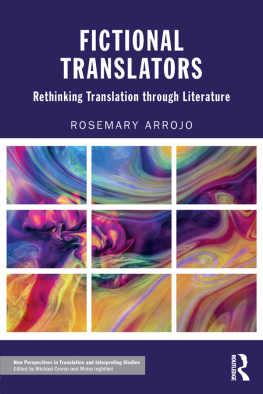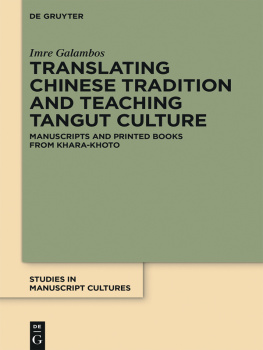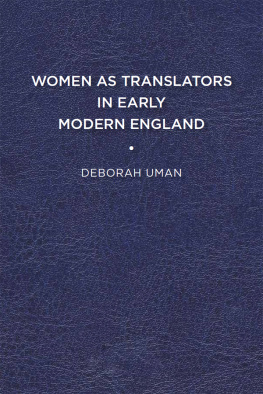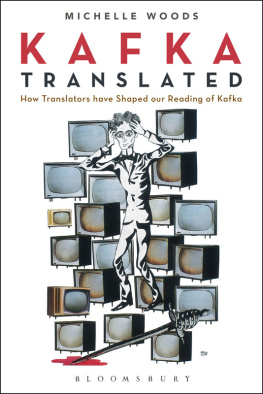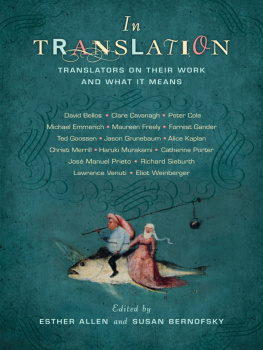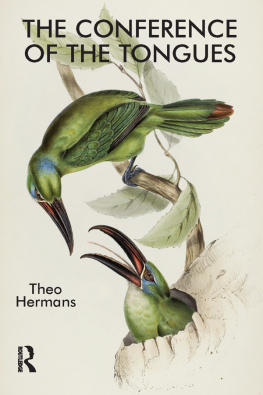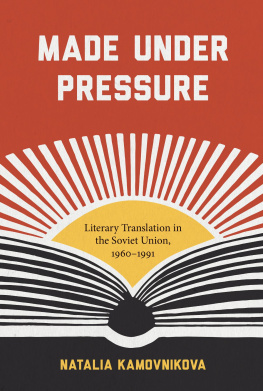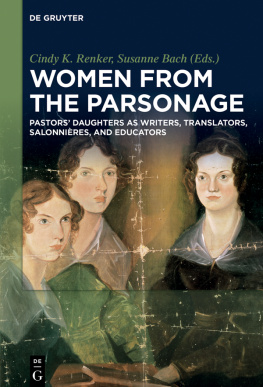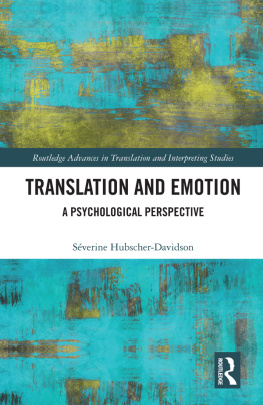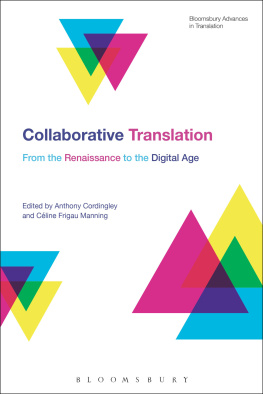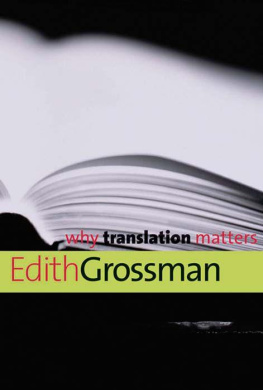Fictional Translators
Through close readings of select stories and novels by well-known writersfrom different literary traditions, Fictional Translators invites readers torethink the main clichs associated with translations and shines a light onthe transformative character of the translators role and the relationshipsthat can be established between originals and their reproductions. Arrojoexpertly builds her arguments on the basis of texts such as the following:
Cortzars Letter to a Young Lady in Paris
Walshs Footnote
Wildes The Picture of Dorian Gray and Poes The Oval Portrait
Borgess Pierre Menard, Author of the Quixote, Funes, His Memory, and Death and the Compass
Kafkas The Burrow and Kosztolnyis Kornl Esti
Saramagos The History of the Siege of Lisbon and Babels Guy de Maupassant
Scliars Footnotes and Calvinos If on a Winters Night a Traveler
Cervantess Don Quixote
Fictional Translators provides stimulating material for refl ection not onlyon the processes associated with translation as an activity that inevitablytransforms meaning, but, also, on the common prejudices that haveunderestimated its productive role in the shaping of identities. This book iskey reading for students and researchers of Literary Translation, ComparativeLiterature, and Translation Theory.
Rosemary Arrojo is Professor of Comparative Literature at BinghamtonUniversity, USA.
New Perspectives in Translation and Interpreting Studies
Series editors:
Michael Cronin holds a Personal Chair in the Faculty of Humanities andSocial Sciences at Dublin City University.
Moira Inghilleri is Director of Translation Studies in the ComparativeLiterature Program at the University of Massachusetts Amherst.
The New Perspectives in Translation and Interpreting Studies series aims toaddress changing needs in the fi elds of translation studies and interpretingstudies. The series features works by leading scholars in both disciplines, onemerging and up-to-date topics. Key features of the titles in this series areaccessibility, relevance, and innovation.
These lively and highly readable texts provide an exploration into variousareas of translation and interpreting studies for undergraduate andpostgraduate students of translation studies, interpreting studies, andcultural studies.
Cities in Translation
Sherry Simon
Translation in the Digital Age
Michael Cronin
Translation and Geography
Federico Italiano
Translation and Rewriting in the Age of Post-Translation Studies
Edwin Gentzler
Eco-Translation
Michael Cronin
Translation and Migration
Moira Inghilleri
Fictional Translators
Rosemary Arrojo
Fictional Translators
Rethinking Translation Through Literature
Rosemary Arrojo
First published 2018
by Routledge
2 Park Square, Milton Park, Abingdon, Oxon OX14 4RN
and by Routledge
711 Third Avenue, New York, NY 10017
Routledge is an imprint of the Taylor & Francis Group, an informa business
2018 Rosemary Arrojo
The right of Rosemary Arrojo to be identifi ed as author of this work has been asserted by her in accordance with sections 77 and 78 of the Copyright, Designs and Patents Act 1988.
All rights reserved. No part of this book may be reprinted or reproduced or utilized in any form or by any electronic, mechanical, or other means, now known or hereafter invented, including photocopying and recording, or in any information storage or retrieval system, without permission in writing from the publishers.
Trademark notice: Product or corporate names may be trademarks or registered trademarks, and are used only for identifi cation and explanation without intent to infringe.
British Library Cataloguing in Publication Data
A catalogue record for this book is available from the British Library
Library of Congress Cataloging in Publication Data
A catalog record for this book has been requested
ISBN: 978-1-138-82713-4 (hbk)
ISBN: 978-1-138-82714-1 (pbk)
ISBN: 978-1-315-73872-7 (ebk)
Typeset in Sabon
by Saxon Graphics Ltd, Derby
To the memory of my parents, Catharina Visconte and Raphael Arroyo
Contents
I am grateful to all the countless colleagues, students, and friends with whom, in the last few decades, I have had the privilege of sharing my enthusiasm for critical theory and literary fiction in multiple venues and institutions not only in Brazil and the United States, but also in other countries such as Turkey, Austria, Germany, Spain, Italy, Australia, and Northern Ireland. My analyses of most of the stories and novels discussed here were developed throughout many years and I am especially thankful to the colleagues who have edited previous versions of some of the pieces that I have revisited for this book. With their careful readings, these colleagues have helped me sharpen my thinking and refine my writing: Edwin Gentzler, Maria Tymoczko, Maria Calzada Prez, Jos Santaemilia, Jos Mara Rodrguez Garca, Carol Maier, Franoise Massardier-Kenney, Brian J. Baer, Klaus Kaindl, and Karlheinz Spitzl. I am forever indebted to Ben Van Wyke, who has been kind enough to read most of what I have written in the last decade or so and always offers me pertinent feedback and teaches me some English. I would like to thank Routledge and, more specifically, Michael Cronin, whose comments on my work have been stimulating and extremely helpful; and Laura Sandford, who has played the role of a kind, understanding publisher in the story of my life in the past two years. I am deeply grateful to my sister, Ana Maria Arrojo, whose friendship and care have been fundamental, particularly in the difficult times that coincided with the writing of most of the chapters that constitute this book.
This book has been engendered by my long-held conviction that fictional representations of the work of translators will shine a special, often unexpected light on the scene of translation as an asymmetrical encounter between different languages, interests, and perspectives. In addition, and perhaps more importantly, these representations are likely to allow some glimpses into what might be lurking behind the prevailing clichs associated with such an encounter and, therefore, into what is often repressed, barely theorized, or even acknowledged by conventional narratives about translators and their practice, particularly when this practice involves texts highly valued like those labeled as literary. In contrast to the usually sober discourse of scholarly studies, fictional texts focusing on issues of translation, authorship, and reading can provide a more nuanced frame of reference as they introduce us to translator characters that oftentimes reveal their inner struggles while facing the ethical conundrums associated with their work and the relationships they are expected to establish with author and/or reader figures that also have a stake in the process.
The storylines examined in this book feature intriguing versions of the all too familiar dilemmas that have informed the common discourse on questions of translation and interpretation for millennia and are mostly associated with the suspicious status of the translated text as the translators potentially inaccurate replacement of somebody elses original in another language and context, a replacement that inevitably fails to repeat sameness and for that is often perceived as a threat that can unsettle the alleged authority of the original and/or its author. A critical examination of these issues is especially relevant in the context of contemporary viewpoints that recognize the interfering role of translators not as something that needs to be curtailed or penalized, but as part and parcel of the process that inevitably transforms texts across languages and whose circumstances and motivations should be carefully investigated. I am referring to the importance of post-Nietzschean thought for an understanding of interpretation, often represented by approaches associated with deconstruction, poststructuralism, gender, and postcolonial studies that challenge essentialist conceptions of language and text and underscore the interpreters and the translators authorial role in the shaping of meanings and identities. As the translators visibility became the focal point of such trends within the discipline of translation studies, we started paying closer attention to the strong link that binds questions of language to power, and, therefore, to what ultimately anchors the hierarchical relationships that have defined the production and the reception of translations.

